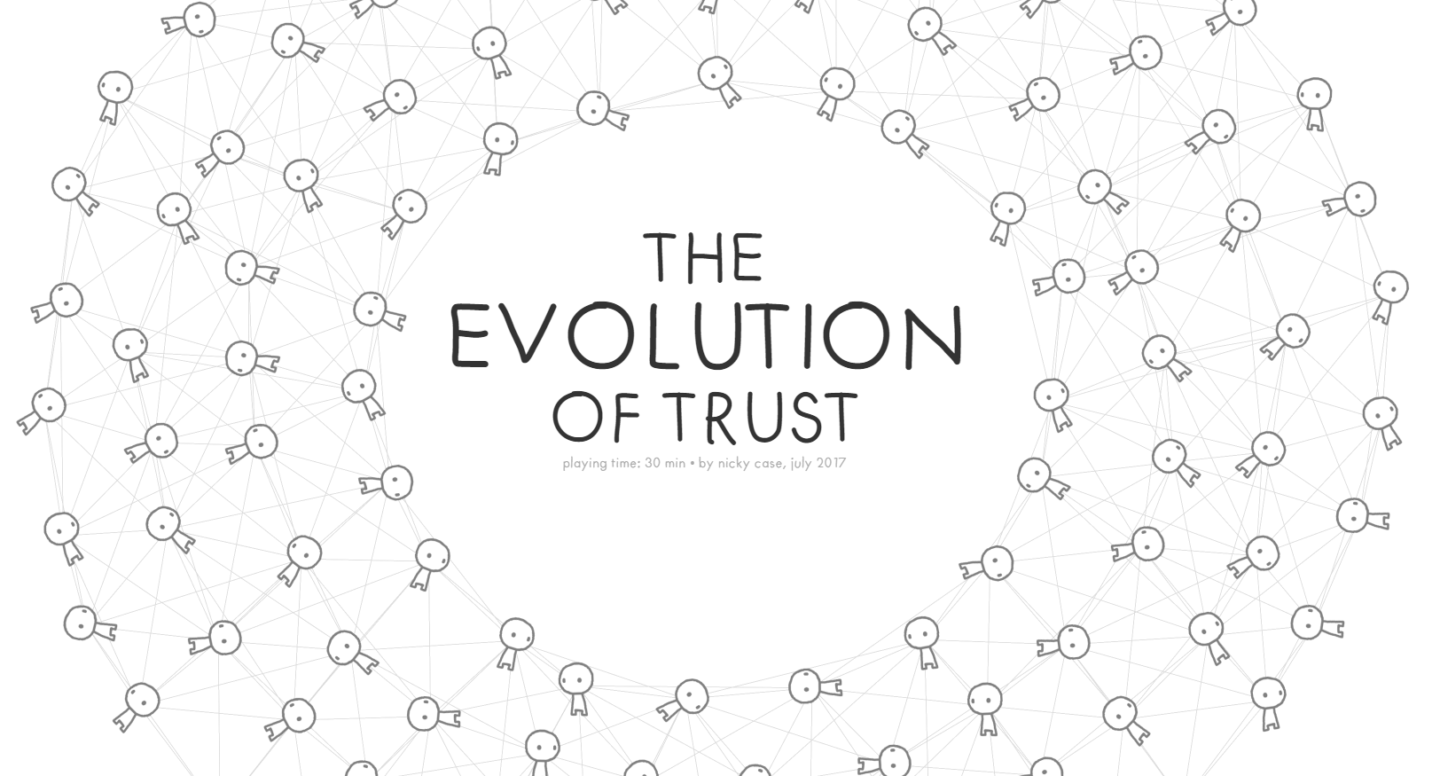To get a better understanding of trust, let’s play a game! Nicky Case made an amazing online game that takes about 30 minutes to complete and shows how the evolution of trust can be shown using game theory! Click the link below to start playing and return to the blog when you are done playing: https://ncase.me/trust/
Did you enjoy the game and learning about the evolution of trust? Let’s review what Nicky taught us about the evolution of trust:
- Repeat Instructions – Trust keeps a relationship going, but you need the knowledge of possible future repeat interactions before trust can evolve.
- Possible Win-Wins – You must both be playing a non-zero-sum game, a game where it’s at least possible that both players can be better off – a win-win.
- Low Miscommunication – If the level of miscommunication is too high, trust breaks down. But when there’s a little bit of miscommunication, it pays to be more forgiving.
- What the game is, defines what the players do – Our problem today isn’t just that people are losing trust, it’s that our environment acts against the evolution of trust… In the short run, the game defines the players. But in the long run, it’s us players who define the game.
(Case 2017)
How can we apply what we know from Nicky’s teachings to the workplace? I would like to break it down into 3 general interactions you would typically see: your relationship with your clients, colleagues, and superiors.
Trust with clients (customers, business partners, students, patients, etc.) is something that can best be displayed based on the first of Nicky’s learnings; how many times will you repeat this interaction with this person? In most cases, you want a long lasting relationship between you and a client that can build trust over time. You need to allow trust to build over time to truly form that bond. Unfortunately, today we see many businesses try quick “cash grabs” that ultimately never leave clients satisfied and feel as if they have been “cheated.” This is why it is important, if you want a long and healthy relationship with your client, to cooperate over time and let the trust evolve.
Colleagues can be best described using the possible win-wins learning. Oftentimes at work we get caught up in what our colleagues are doing, not because we are nosy, but because we work at the same place and have a lot of similar work. However this can potentially invoke a jealous or resentful response in ourselves and others. This is very common in sales teams, where one salesperson may or may not be getting preferential treatment and/or more sales opportunities than others. This causes a lot of tension in the workplace and on the team. Remember, you are a member of a team no matter where you work and you are all focused on the same goals. Having conversations about creating win-win scenarios for all team members can lead to building trust within the team. This often leads to happier employees and better performance.
Lastly, your relationship with your superiors is always a tricky one. You always feel as if they have the upper hand and the last say, so building trust with one to support your opinions and decisions is vital. The most important aspect of this relationship is limiting miscommunication. The amount of interactions you have with your superiors may vary, but you will always try to make the best possible win-win scenario. This leaves communication as the last and structural component to this evolution of trust. Presenting your opinions and results to superiors can make or break a company’s success. You may be doing an excellent job, but when it comes to reporting to a superior, explain yourself and your thought process to the best of your ability. The same goes for the superior. It is their responsibility to accurately communicate the goals they are trying to achieve for the company and what they need you to accomplish, otherwise they are not only wasting your time, but they are also losing your trust.
Kathy Cefalu, Chief Human Resources Officer at TDS Telecom, had this to say regarding trust:
It’s one of those characteristics of relationships that gets judged and defined by individuals, but can certainly vary because it’s gained over time… Trust is paramount in our work and personal lives – and so incredibly important that we have trust in place in order to create the most healthy/high performing environments in both our work and personal lives.
I’ve always appreciated the teaching of Stephen Covey. He says, “Trust is the glue of life. It’s the most essential ingredient in effective communication. It’s the foundational principle that holds all relationships.”
Trust can be tricky, because when broken – the relationship may never be the same as when strong trust existed.
Building trust in the workplace is essential to creating the best environment possible where each individual can come to their job bringing their absolutely best/authentic self to do great work.
As we’ve moved into our current work-from-home environment (for many of our associates) connecting more frequently virtually is mission critical (since we don’t have face-to-face/physical meetings). Each work team needs to create their own cadence of one-on-ones and team meetings that works best for them. I enjoy meeting with my direct reports on a weekly basis in one-on-ones and a team meeting with our HR leaders. For many, many years I have also worked to have individual skip level meetings (meet with my direct reports, direct reports) at least twice per year with the following invite message:
One of the ways I would like to continue to enhance the communications within our department is to continue holding skip-level meetings.
- What is a “skip-level” meeting? A chance for me to meet with my direct reports, direct reports
- Why do I want to do this? Chance for me to continue to get to know you better, your career aspirations, gather information on key goals or our day-to-day initiatives that you are working on. Will hopefully help me understand any issues that I am unaware of so we can work to continually improve.
- Most importantly, what’s in it for you? Chance to make sure that I understand your background, experience & career aspirations. Opportunity to share the things we should continue doing, the things we should start doing and the things we should stop doing!
Some really great insights and tips that you can incorporate into your work environment from Kathy and Nicky! As Nicky mentioned, what the game is, defines what the players do. So if the game (your relationships) are struggling in any way, take a few of these steps to help evaluate the trust you have in that person.
If you would like to learn more about Nicky Case and/or play some of their other fantastic games check out the link below to her website!
-Brandon Allen

